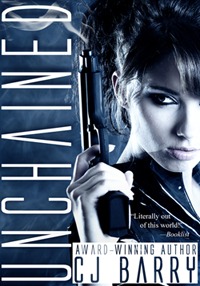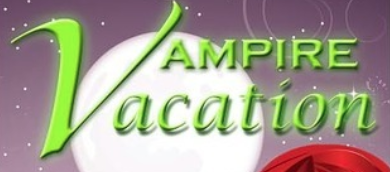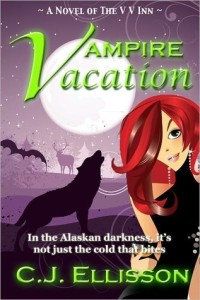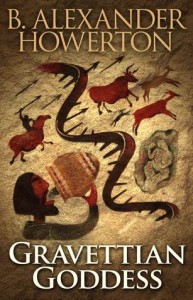 I grabbed a copy of C. J. Barry‘s Sci-fi Romance, Unchained from the Kindle free list.
I grabbed a copy of C. J. Barry‘s Sci-fi Romance, Unchained from the Kindle free list.
Description from Goodreads:
Cidra Faulkner saw her family murdered and her people condemned for a crime they didn’t commit. Now a skilled Kin-Sha warrior, she vows to track down the true culprit and exact justice, both for her family and all the Kin-Sha.
Intergalactic treasure hunter Grey Stone had no intention of helping Cidra until his old mentor tricked him into it. Now he’s trapped into helping the daughter of the man who brought about the downfall of his people — a woman whose very presence jeopardizes all he’s worked for.
But honor won’t let him say no. And love won’t let him turn back.
Review: (slight spoilers)
This was an all right read…or at least I decided it was once I let go of any science fiction expectations and accepted that it’s really just a romance that happens to be set in space. It’s heavy on the sexual tension and light on…well, light on just about everything else. But it’s still an enjoyable read. Having said that, there were a number of points that really irked me.
For one, Cidra is said to be a well-trained Kin-sha practitioner (think some high level martial arts form). And though we do OCCASIONALLY see her use those skills to kick some butt, she is still very much a coddled, protected princess. The bent of the story is very much one in which the H wants to protect his h and in order to make this possible Cidra feels very fragile. As is so common in fiction, her ‘strength’ comes in the form of being willing to sacrifice herself for the good of others (in other words, her pure heart). How many times have I seen that trait in a heroine?
For another (and this is a personal pet peeve), the primary way that grey is described is as ‘primally male.’ Granted it was rephrased a few times, ‘masculine’ was used on occasion, etc. But the whole thing drove me to distraction, for a couple reasons. One, it’s a HORRIBLE way to describe a man as sexy. It infers that just by virtue of being male he is attractive to Cidra. I get that what the author is going for is that he possesses the attributes women find attractive in a man in abundance. I do get that, but it’s not actually what is said when the narrator says things along the line of:
He glided from position to position, purely, powerfully male. It called to her on a level she couldn’t explain.
Cidra gasped at his masculine power and hunger.
She pressed the length of her body to his, absorbing the fluid flow of male strength.
He was pure male muscle and strength.
What this actually does is separated the trait that is being male from the character and it alone is presented as attractive, not Grey himself. It’s dehumanising (just as it would be for women). At it’s most basic, it suggests that Cidra is attracted to a man (with no further description necessary to attract her). Is that really all we need here?
Second, if being a man is all it takes…or even extrapolating the argument out to include the appealing male attributes that calling him MALE (which how is should be said) is supposed to be relaying, Rourke or Bohr should be better candidates for Cidra’s attention. Both are bigger and more muscular…more masculine or MALE according to any circumstance in which MALENESS is enough to make someone sexy and attractive. Argg. Surely there are better adjectives out there!
For the most part, I thought that the writing was fine. There were a lot of really abrupt scene changes. The book could really do with some form of indication for this, heck even a line of asterisks would do. But I needed something to warn me, ‘hey, you’re leaving Grey and Cidra now and are gonna spend some time with Rourke and Decker.’
There were times that it was painfully predictable, however. This was mostly because the set up to some scenes was so readily apparent. Here’s an example: at one point Cidra and Grey travel to a very male-dominated planet to speak to a socially powerful man. Before Cidra even got off the ship I knew, just KNEW that at some point he (Bohr) would corner her and try to force himself on her. Not ten pages later, that’s exactly what happened.
I was further annoyed at this particular instance because it also presented an inconsistent cultural construct. Women were supposed to be severely oppressed and hold almost no rights. However, the woman Cidra meets isn’t at all cowed by her social situation as someone raised to believe herself a secondary citizen should be. Her (Sil’s) boldness didn’t fit the culture she was placed in. What’s more, there was supposed to be some sort of law empowering women whose mates weren’t faithful. Why would a über male-dominated culture that doesn’t believe in women’s rights or autonomy contradictorily provide them the legal means to castrate their husbands? Wouldn’t happen!
It was also incredibly repetitive about certain things, like Grey’s overpowering maleness. ‘Heat’ was another one. I realise these characters aren’t necessarily human, just humanoid. But Grey must run hot, ’cause his body heat seared Cidra in a hundred different ways. She felt is ‘wrap around her.’ His ‘masculine scent and body heat swept her senses.’ His ‘close proximity generating more heat than…’ ‘His big body wrapped around her, gilding her with his heat…’ She felt ‘the incredible heat of his arms.’ She could ‘feel his heat through the thin fabric…’ At one point heat even ‘roared through him like a supernova’ and he experienced ‘burning arousal.’ (I bet that’s painful.) I could go on. I stopped keeping track at about 50% and only started once I’d read enough to notice the repetition. But it’s the primary way that lust is expressed here.
It was only exacerbated by the way Grey’s virulence was highlighted by being described as barely contained (like fire?). He came across as hardly able to control himself at all. He was always on the edge of snapping or unable to think or move on account of something he saw in/on Cidra. He even growled on occasion. He definitely came across as a bit of an ape-man and I don’t think he was supposed to.
Lastly, there’s a fairly massive coincidence at about 90% that was less than believable. It felt very contrived and convenient. It did however bring all of the characters together at last.
So, all in all, I had a lot of personal complaints. There were a lot of points that bothered me, even as I generally liked the characters themselves. But these points may not bother other people. As a piece of fluffy entertainment, it did the job. Oh, and it really is a stand-alone book. It ends!



 Author,
Author,